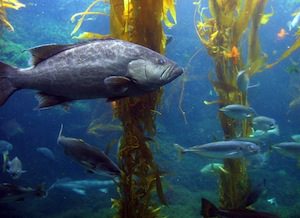Acid Oceans Harm More Species
Several marine species are reacting badly to the increasing acidity of the world's oceans, caused by climate change as carbon dioxide dissolves in the water.
By Tim Radford, Climate News NetworkThis piece first appeared at Climate News Network.
LONDON — The chemistry of the oceans is changing. And it isn’t just the corals and the baby oysters that are unhappy. It makes juvenile rockfish really anxious, and it upsets the digestion of sea urchins.
The pH (a measure of acidity – the lower the pH, the more acid the water) of the planet’s oceans is dropping rapidly, largely because the carbon dioxide levels in the atmosphere are increasing. Since carbon dioxide dissolves in water to form carbonic acid, the seas are responding to global change.
The first and clearest victims are likely to be the corals, which are adapted to a specific value of pH in the oceans, but there have also been problems reported by oyster farmers.
Now Martin Tresguerres of the University of California, San Diego reports in the Proceedings of the Royal Society B that at least one species of juvenile fish responds badly to the changes in ocean chemistry.
There is a natural aspect to ocean acidification – submarine volcanoes discharge carbon dioxide and turn the deep seas around them to a kind of fizzing champagne, and upwelling ocean currents can occasionally deliver a stressful level of lower pH sea water to blight fishing waters.
But Tresguerres reports that he and colleagues subjected young Californian rockfish to the kind of water chemistry predicted as atmospheric carbon levels rise, and then measured their behaviour in response to changes of light in the aquarium, and to an unfamiliar object in the tank.
Stomach problems
What the researchers found was that the lower pH had a pronounced effect on one of the fish neuroreceptors linked to anxiety, and this effect lasted for at least seven days after the little creatures were returned to normal sea water. The change was not permanent: normal responses seemed to return after 12 days.
Meanwhile, across the Atlantic, Meike Stumpp of the University of Gothenburg in Sweden has been looking at how sea urchin larvae respond to altered pH in the seas. She and colleagues report in Nature Climate Change that they too tweaked the seawater chemistry, to discover that digestion took longer and was less effective, a bit of a problem for any young creature – especially one hardly a fifth of a millimeter in length – in the competitive world of the oceans.
“My measurements demonstrated a very strong pH dependency”, she said. “The enzymes in the sea urchins’ stomachs are optimised to function at very high pH – which is different from the situation in mammals, where stomach pH is acidic and enzymes work best at low pH.”
The implications are that as pH levels fall, life will become a great deal more problematic for at least some key marine species. And the likelihood of change is increasing. Scientists of the International Geosphere-Biosphere Programme recently allotted a “very high” confidence level to a set of simple findings.
One was that humans were indeed making the seas more acidic, another was that the capacity of the oceans to absorb carbon dioxide would fall with increasing acidity, and a third was that the impact of this change in water chemistry would be felt for centuries. They also had “high confidence” that cold water corals and mollusc communities would be affected.
Your support matters…Independent journalism is under threat and overshadowed by heavily funded mainstream media.
You can help level the playing field. Become a member.
Your tax-deductible contribution keeps us digging beneath the headlines to give you thought-provoking, investigative reporting and analysis that unearths what's really happening- without compromise.
Give today to support our courageous, independent journalists.






You need to be a supporter to comment.
There are currently no responses to this article.
Be the first to respond.